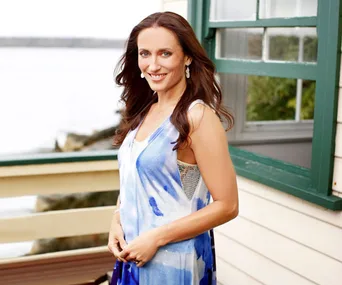Georgie Parker is always on the go.
The winner of seven Logies (two gold) and star of iconic TV roles including Lucy Gardiner in A Country Practice, Terri Sullivan in All Saints and Ruth “Roo” Stewart in Home and Away, combines a stellar acting career with marriage and motherhood which is why, when the athletic beauty faced major surgery in February this year, she didn’t let it phase her for long.
After years of pain, Georgie had a hip replacement and, despite the slow and sometimes painful rehabilitation, at the age of 53, the actress tells The Weekly team it’s as if she’s been given a whole new lease on life.
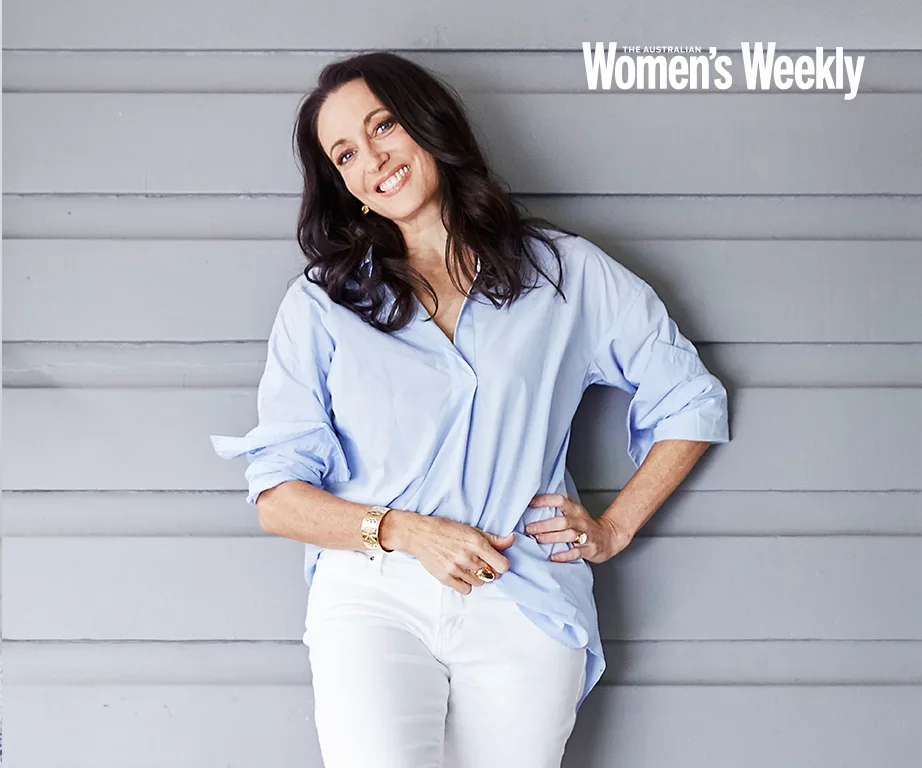
Georgie’s health took a major turn for the better after her surgery in February.
“It’s like I have a different body,” Georgie says with a little shimmy and a swivel to the left. “I’ve got my body back from having a titanium hip. It was a big operation but four days later, I twisted my body to the left and I hadn’t been able to do that for 10 years.”
That’s saying something when you’re a self-confessed fidget like Georgie – and always have been, even as a child.
“I was not that different from how I am now,” she laughs. “I was what you would probably term hyperactive. Now they might call me ADHD, but I’m not. I’m a mover. I need to move. I was an avid ballet dancer and I just charged through my life, with occasional bouts of deep daydreaming. I was either very loud or completely silent. The daydreaming was where I came up with ideas for characters and ideas about life. I observed people a lot. It was just the way I made sense of the world.”
But Georgie’s need for a new hip is not the first time the star has faced such a physical ordeal. At the age of 13, all the dancing and sport that the young Georgie revelled in came to an abrupt halt when she was diagnosed with the spinal condition, scoliosis.
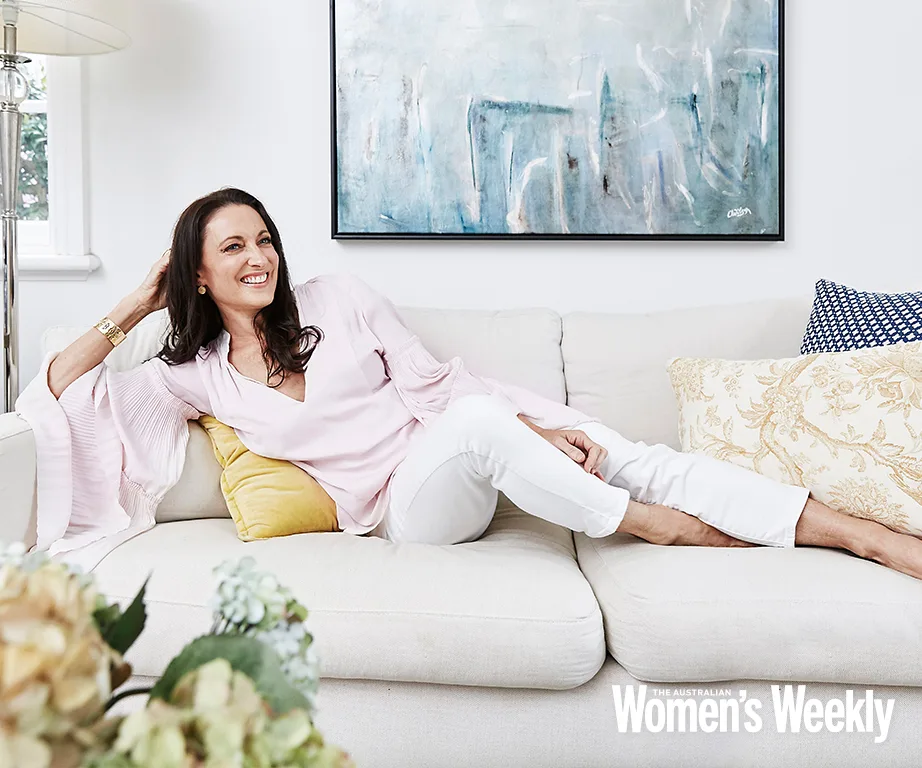
“My family gives me the most joy – always,” Georgie says.
“That changed a lot of things for me,” Georgie admits. “It changed the way I did things but it didn’t stop me doing things. I was a very good tennis player and I was very good at softball and all of a sudden I had to play with my brace on. I had a Boston Brace, which covered my torso. It was made of fibreglass and you harnessed it up at the back. It hasn’t really changed. It’s like tying a rope around a tree to straighten it up as it grows.”
Georgie wore the brace for three years. She was allowed to take it off for ballet classes but the scoliosis was so severe (her spine has a 59 degree curve) that she knew she would never be a professional dancer. That was a blow but Georgie characteristically made the best of it.
“I had to go into hospital every three months and have x-rays and blood tests, so it was quite serious, but I didn’t feel any different. So, in my mind, it was bad but it wasn’t that bad.
“It was a huge learning curve for me because people did start to treat me differently. Some people would talk slowly to me. It was like, ‘Oh my God, you’re special now.’ And I was like, ‘I can take my brace off but I guess you can’t stop being stupid.’ I did say that to someone once. It helped that I was a smart arse too.
“I was very confident but not in a showy way, and very optimistic. That’s just the way I came out. I never felt sorry for myself. In some ways, I think I was fortunate to have an experience like that very early on because it was really like – this is what’s happening now, you can’t go around it, you can’t pretend it’s not happening – you’ve just got to grab it and move forward with it. And I was determined. I was told I would always need help putting the brace on but I figured out how to do it myself. I figured out how to make it work for me whilst doing what I wanted to do.”
Wearing a brace also helped Georgie carve out her own individual identity beyond the stereotypes that seemed to so deeply affect other girls.
“I just never thought of myself as a girl,” she admits. “I thought, if I rigidly define myself by my gender, it’s very limiting, so I’ll pick and choose [the characteristics] I want. I defined myself as a human being. I know that sounds weird but it freed me up from feeling like I had to fit in.
“Because of the brace, I had to wear loose clothes, so I borrowed my dad’s shirts and I wore kaftanny things.”
It made her appear a little bit bohemian and fashion forward. “If you’re daggy enough, you get cool. And luckily, I had friends who were independent enough in their spirit to go, ‘Yeah, we’re going to do that too.’ I didn’t shave my legs for a long time. Then I gave up the hairs on my legs for Lent. I think, if we freed ourselves up a bit from those gender expectations – if we just raised people to be who they are – then you’d get a happier bunch of people.”
Listening to Georgie talk, it’s clear that she’s someone who likes a chat but what she doesn’t mention much is love. Perhaps that’s because she holds close those things that are most precious. So when she does speak about matters of the heart, you stop and take notice.
On this grey and drizzly Saturday, Georgie’s husband, writer Steve Worland, and their 17-year-old daughter, Holly, are running errands. They message to say they’re having a good time, and Georgie smiles.
“You know,” she says, “when I first met him, I thought, this is a person I could rely on. That was an important thing to me at the time and he was the sort of person who, if he said he was going to do something, he would do it. If he said he would be somewhere, he would be there. There was also a deep kindness there, and he was someone who I felt I could talk to forever and ever and ever. He’s funny and smart.”
Georgie has been bounding about for the camera all morning. A bundle of irrepressible energy, she is one minute leaping onto the couch, the next shimmying down the corridor to Aretha Franklin. She and Steve, she says, are “completely different” in most ways, so opposites do attract.
“If you were going to compare us, I would say he’s the introvert. But when I go home, I tend to sit and daydream and plod around and put some music on. So he’s much more animated than I am then.”
She ponders that perhaps that’s because writing is so often a solitary pursuit, “so he needs people. We balance each other out.”
Coming home is always the best part of Georgie’s day.
“We tend not to go out,” she admits. “There’s only the three of us and the cat.”
Georgie has settled now. She has arranged herself on a bentwood chair, with all the grace of the ballerina she once dreamed she’d become, and we chat about love and family and the things that give her joy.
“My family gives me the most joy – always,” she says, and by that she means Steve and Holly of course, but also her parents, Tony and Rosemary, and her siblings, Vicky and Michael with whom she grew up in the Sydney suburb of St Ives.
Her father was the designer of the iconic Australian Parker Furniture, original pieces of which have now become both covetable and collectable.
“His work has become art,” Georgie says with pride. “He would sit at the TV and get a small piece of paper and sketch. My daughter is an artist now and she does similar things. Just to pass the time, she sketches – trees, people, faces – if she was sitting here, she would sketch you. But my father used to sketch tables. He has a very creative mind. He’s turning 89 next May and he’s amazing. I don’t know if he doodles anymore but my sister and I would like him to. We’ve bought him a canvas and some paints.”
Georgie’s mother was a former school teacher. “It was the era when you gave up work to raise a family,” she explains, “but I think Mum should have gone on because she’s so intellectually curious. She still does adult education classes.”
When it became clear that Georgie was happiest on the stage, her mother also became her greatest supporter: “She believed in me 100 per cent. Mum drove me to auditions and helped me run lines. She never doubted me for a minute. She just let me be me.”
At 18, Georgie auditioned for and scored a coveted place in a national theatre company that was part of the Elizabethan Theatre Trust. Not long after, funding was cut and the company folded but it gave her the courage to get an agent and keep auditioning, and gradually the roles came.
In 1988, she scored some major breaks, including a supporting part in the fringe comedy feature, Young Einstein, and the role of Lucy Gardiner/Tyler in A Country Practice, which saw her through four years and 266 episodes.
She took four months off when Holly was born and otherwise she has been in work pretty consistently ever since – an immense feat in a notoriously precarious industry.
Also at 18, Georgie started dreaming of becoming a mother. “I always knew I wanted that to happen but it took some time,” she says. “My sister had three children and I was godmother to a lot of my friends’ kids, but I had to meet the right guy.”
Holly was born just short of Georgie’s 36th birthday “and it took a toll on my back,” she admits, “not so much the pregnancy but afterwards, when everything was loose. I’d always wanted two kids but I just didn’t think I could get my back through it again. Then Steve said, ‘I’m happy with one’. And I think I’ve checked in with Holly every two years, to make sure it’s alright with her, and she’s happy. She’s never said, ‘I wish I’d had a sibling,’ which I’m really happy about because it would have made me feel so bad.”
Georgie didn’t think twice about going back to work after four months. It was right in the middle of her seven-year run as Terri Sullivan on All Saints and, well, the show must go on.
“Luckily we had the best nanny in the world, who is still a family friend, Aunty Suze. And I was really lucky that Channel Seven created a space where she could come to work. Holly would come in, have lunch with me, and if I had some scenes off, we would go for a walk. Even though work took up a lot of time, my priority was always my family, and she knew that.
“I never felt bad about being a working mother because men are not encouraged to feel bad about being working fathers. I don’t like the perception that women are defined as working mothers but men are never defined as working fathers. People would ask, ‘How are you juggling it all?’ And I’d say, ‘Well, she does have a father. We’re doing it together.'”
As the mother of a teenager and a woman whose work necessitates spending a bit of time on social media herself, Georgie says one of the things that concerns her today is the way women are pressured – by men, by other women, by themselves – into presenting themselves online.
“I don’t think all social media is bad,” she concedes. “I just think we haven’t been educated in how to use it yet. I think it can be a really good way to stay in touch with people, but people will always find a way to use it that’s insulting or denigrating.
“My daughter isn’t on any social media at the moment because she found it ridiculous, and I agree with her. Whilst there’s a bunch of people who take pictures of their trees or their cats, there is also a lot of sexualising yourself for approval. The constant, public sexualisation of women does concern me, rather than sexuality being a private thing that you share with one person. I don’t have to show the world how I feel about my sexuality. It’s mine.”
2018 has been an immense year for Georgie. Home and Away has celebrated its 30th birthday, her winter break was a dream trip through Switzerland and Italy, and since her return she’s been immersed in rehearsals for a formidable, fascinating play. Luna Gale, which opens at the Ensemble Theatre in Sydney on September 12, is an emotionally complex piece about child protection and custody in which Georgie plays a social worker. It’s taught her, she says, about the difficulty of finding perfect outcomes in an imperfect world.
Georgie pulls out her phone to share a series of impressive shots of the new body in action at a Pilates class. She swims, she does Pilates and lifts weights at the gym, not just to keep the body limber but because, as she says, she loves to move.
Clouds are gathering again across the harbour as we pack up to leave. Georgie is off to swim laps in the spring rain at a local open-air pool (she’ll wear a half-wetsuit, she assures us). After that, she might phone a friend.
“Friendships are the most important things in the world to me,” she says. “Steve and Holly, my sister, my brother, nieces and nephews, my mum and my dad, and those people in my life who understand me and I understand them. Every day, I try to ring one of them – I try to keep those connections alive.”
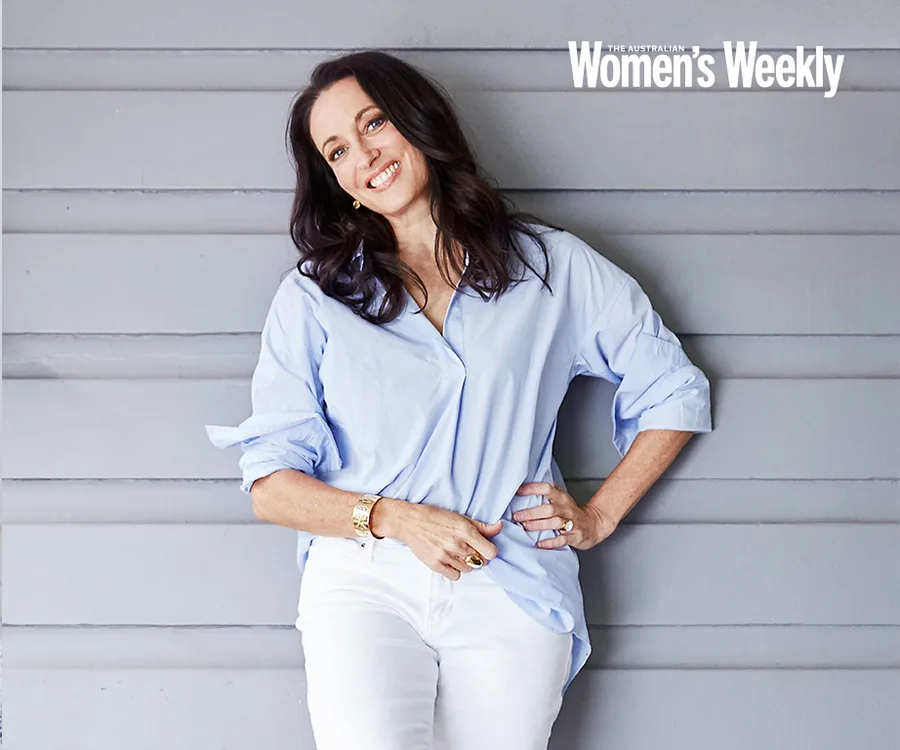

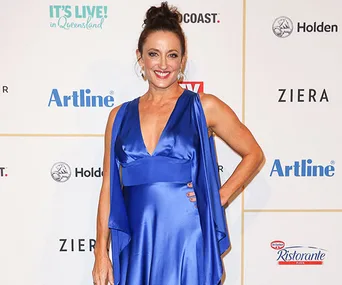
.jpg?resize=380%2C285)
